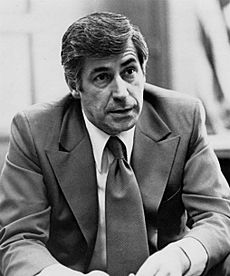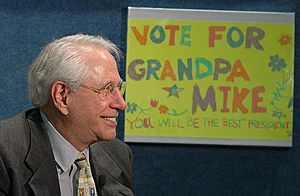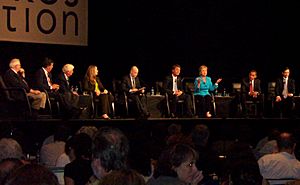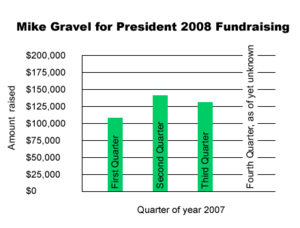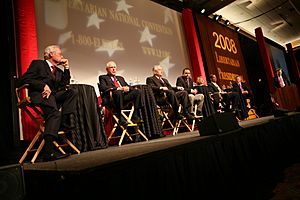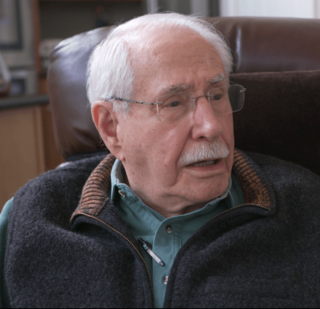Mike Gravel facts for kids
Quick facts for kids
Mike Gravel
|
|
|---|---|
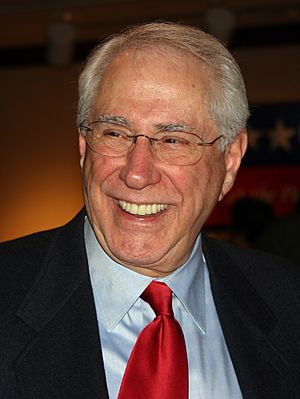
Gravel in 2008
|
|
| United States Senator from Alaska |
|
| In office January 3, 1969 – January 3, 1981 |
|
| Preceded by | Ernest Gruening |
| Succeeded by | Frank H. Murkowski |
| 3rd Speaker of the Alaska House of Representatives | |
| In office January 25, 1965 – January 22, 1967 |
|
| Preceded by | Bruce Kendall |
| Succeeded by | Bill Boardman |
| Member of the Alaska House of Representatives from the 8th district |
|
| In office January 23, 1963 – January 22, 1967 |
|
| Preceded by | John S. Hellenthal |
| Succeeded by | Michael F. Beirne |
| Personal details | |
| Born |
Maurice Robert Gravel
May 13, 1930 Springfield, Massachusetts, U.S. |
| Died | June 26, 2021 (aged 91) Seaside, California, U.S. |
| Political party | Democratic (before 2008, 2010–2021) |
| Other political affiliations |
Libertarian (2008–2010) |
| Spouses |
Rita Martin
(m. 1959; div. 1981)Whitney Stewart
(m. 1984) |
| Children | 2 |
| Education | Columbia University (BS) |
| Signature |  |
| Military service | |
| Allegiance | |
| Branch/service | |
| Years of service | 1951–1954 |
| Rank | |
Maurice Robert "Mike" Gravel (born May 13, 1930 – died June 26, 2021) was an American politician and writer. He served as a United States Senator for Alaska from 1969 to 1981. He was a member of the Democratic Party. Later in his life, he ran for president twice.
Gravel was born and grew up in Springfield, Massachusetts. His parents were immigrants from French Canada. In the late 1950s, he moved to Alaska. There, he became a real estate developer and started his political career. He served in the Alaska House of Representatives from 1963 to 1967. He also became the Speaker of the Alaska House. In 1968, Gravel was elected to the U.S. Senate.
As a senator, Mike Gravel became known for trying to end the military draft during the Vietnam War. He also made the Pentagon Papers public in 1971. These were secret government documents about the war. In 1972, he ran for Vice President. He then played a key role in getting Congress to approve the Trans-Alaska pipeline in 1973. He was re-elected to the Senate in 1974. However, he lost his bid for a third term in 1980.
Gravel was a strong supporter of direct democracy. This idea means citizens would vote directly on laws. He ran for president in 2008 as a Democrat. When that campaign didn't gain much support, he joined the Libertarian Party. He ran for president again in 2020 as a Democrat. Two years before he passed away, Gravel and his team started The Gravel Institute. This is a group that works on progressive ideas.
Contents
Early Life and Education
Mike Gravel was born on May 13, 1930, in Springfield, Massachusetts. He was one of five children. His parents were immigrants from French Canada. He grew up in a working-class neighborhood. He spoke only French until he was seven years old. His father taught him the value of hard work. His mother stressed the importance of education.
Gravel went to Catholic schools. He later said he struggled because of undiagnosed dyslexia. He finished elementary school in 1945. A summer job led him to help with local political campaigns. He was very impressed by the power of political office.
He then went to Assumption Preparatory School. An English teacher helped him improve his language and public speaking skills. Gravel's grades got much better. He graduated in 1949. He studied at Assumption College for a year. Then he transferred to American International College. He was influenced by writers who challenged common ideas and authority.
Military Service
Around May 1951, Gravel joined the U.S. Army for three years. He wanted to join the Counterintelligence Corps. After training, he became a second lieutenant in 1952. He was sent to West Germany. There, he did surveillance work. Later, he moved to France. His French language skills helped him go to French communist rallies. He worked as a Special Agent until 1954. He eventually became a first lieutenant.
After leaving the Army, Gravel went to Columbia University in New York City. He studied economics and earned a degree in 1956. He supported himself by working different jobs. He was a hotel bar boy, a taxi driver, and worked in investment bonds.
Moving to Alaska and Early Politics
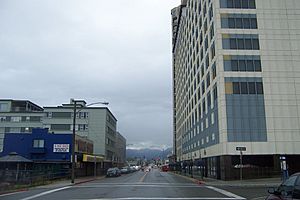
In August 1956, Gravel moved to Alaska. It was not yet a state. He wanted to find a place where he could enter politics without many connections. Alaska's lower voting age of 19 also helped his decision. He started working in real estate sales. He also worked for the Alaska Railroad. Later, he opened his own real estate business in Anchorage.
Gravel quickly became involved in Alaska's community. By 1957, he was a leader for the Democratic Party in Anchorage. He also became president of the Alaska Young Democrats. He was active in the United States Junior Chamber (Jaycees).
In 1958, Gravel ran for the territorial legislature's House of Representatives. He lost that election. At the same time, he strongly supported Alaska becoming a state.
In 1959, Gravel went on a national speaking tour about tax reform. The Jaycees sponsored it. He often dressed as Paul Revere for events. He spoke about "lower taxes, more efficiency in government." He also said that "free enterprise" was important. The tour ended in Washington, D.C.. Gravel, dressed as Revere, rode with petitions to the U.S. Capitol.
Gravel married Rita Jeannette Martin in April 1959. They had two children, Martin and Lynne. In 1960, Gravel ran for the City Council in Anchorage but lost. He became a successful real estate agent and property developer. However, a project ran into financial trouble, and he had to leave it in 1962.
State Legislator
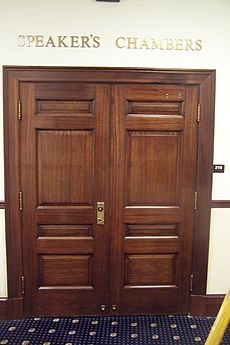
In 1962, Mike Gravel ran for the Alaska House of Representatives. He won and served from 1963 to 1967. He was re-elected in 1964. In his first term, he helped create the Alaska State Commission for Human Rights. He also helped create a high school system for rural Alaska. This allowed Alaska Natives to go to schools closer to home.
When the legislature was not meeting, Gravel continued his real estate work. He became very successful as a property developer.
From 1965 to 1966, he served as the Speaker of the House. This was a surprise to many. He was known for being forceful in this role.
Gravel did not run for re-election in 1966. Instead, he ran for Alaska's seat in the United States House of Representatives. He lost the primary election. After this defeat, he returned to real estate in Anchorage.
U.S. Senator
Election to the Senate in 1968
In 1968, Gravel ran for the U.S. Senate against the 81-year-old incumbent, Ernest Gruening. Gruening was a popular Democrat. Gravel's campaign focused on his youth and good television presence. He used slogans like "Alaska first." He also showed a biographical film called Man for Alaska. This film was shown often on TV and in villages.
Gravel was careful about his views on the Vietnam War. Gruening was strongly against the war. Gravel beat Gruening in the primary election. In the general election, Gravel faced Republican Elmer E. Rasmuson. Gravel won the election on November 5, 1968. He received 45 percent of the vote.
Senate Work and Style
When Gravel joined the Senate in 1969, he joined committees important to Alaska. These included the Interior and Insular Affairs Committee and the Public Works Committee. He also served on the Select Committee on Small Business.
Gravel admitted he was "too abrasive" to be effective in the Senate in the usual ways. He often used attention-getting actions to achieve his goals. He hoped national attention would make other senators listen to him. Some senators, even those who agreed with him, thought his methods were just for show.
Nuclear Issues and the Cold War
In the late 1960s and early 1970s, the U.S. Department of Defense planned nuclear bomb tests in Alaska. These were called the "Milrow" and "Cannikin" tests. They involved exploding nuclear bombs underground on Amchitka Island. Gravel was against these tests. He warned of risks like earthquakes. He asked President Richard Nixon to stop them.
Despite his efforts, the Cannikin test took place in November 1971. Gravel also opposed nuclear power plants. He was a critic of the Atomic Energy Commission. He proposed stopping new nuclear power plant construction.
In 1971, Gravel suggested that the U.S. should recognize and normalize relations with the People's Republic of China. This was six months before Secretary of State Henry Kissinger's secret trip to China.
Vietnam War and the Pentagon Papers
By late 1970, Gravel spoke out against the Vietnam War. He tried to stop a military aid package to Cambodia.
The U.S. military draft was set to end in June 1971. President Richard Nixon wanted to end the draft eventually. Gravel wanted to stop the draft immediately. He tried to block the draft renewal legislation in the Senate. He believed ending the draft would quickly end U.S. involvement in the war. His attempts to stop the draft ultimately failed.
On June 13, 1971, The New York Times began printing parts of the Pentagon Papers. These were secret government documents about the Vietnam War. Daniel Ellsberg, a former Defense Department analyst, had copied them. He wanted to make them public. The Justice Department tried to stop the newspapers from publishing them.
Ellsberg then decided to give the documents to a member of Congress. He chose Gravel because of his efforts against the draft. On June 29, 1971, Gravel tried to read the papers on the Senate floor. When he couldn't, he held a meeting of a subcommittee he chaired. He began reading from the papers with the press watching. He read for hours, saying it was his "constitutional obligation" to share this information. He then put 4,100 pages of the papers into the Congressional Record.
The next day, the Supreme Court ruled that newspapers could publish the papers. Gravel also wanted to publish his portion of the papers. He reached an agreement with Beacon Press. This four-volume set became known as the "Senator Gravel Edition." It was edited by Noam Chomsky and Howard Zinn. Beacon Press faced an FBI investigation. The Supreme Court later ruled that Gravel had immunity for reading the papers in his subcommittee.
These events made Gravel a nationally known political figure. He became a popular speaker.
Domestic Policy
In 1970, Gravel supported a plan for a guaranteed minimum income for poor families. He also supported a "work bonus" for low-income working families. He introduced a bill for campaign finance reform. This bill would have made campaign funding more transparent.
Run for Vice President in 1972
Gravel actively campaigned for Vice President of the United States in 1972. He announced his interest before the Democratic National Convention. On July 14, 1972, the presidential nominee, George McGovern, chose Senator Thomas Eagleton as his running mate.
Gravel was nominated by a delegate from Alaska. He then seconded his own nomination. He received 226 delegate votes. He came in third behind Eagleton and another candidate. The process was chaotic for the Democrats. Eagleton later withdrew from the ticket.
Reelection to Senate in 1974
Gravel was re-elected to the Senate in 1974. He won with 58 percent of the vote. His Republican opponent was C. R. Lewis.
Second Term
After his re-election, Gravel faced some financial challenges from his campaign. There were also stories about his links with lobbyists and fundraisers. Gravel said critics of his fundraising were "naive."
In 1975, Gravel proposed cutting the number of U.S. troops overseas. He was also named a Congressional Adviser to a special session of the United Nations General Assembly.
Gravel had a disagreement with his main financial supporter, Barney Gottstein, in 1978. Gottstein opposed selling F-15 fighter jets to Saudi Arabia. Gravel voted for the sale and spoke in favor of it. This ended their friendship.
Alaskan Issues
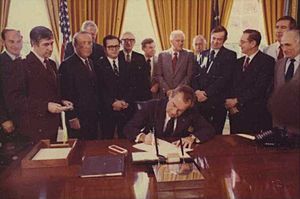
By 1971, Gravel strongly supported building the Trans-Alaska pipeline. He said the builders should be fully responsible for any environmental damage. In 1973, a court blocked construction permits. Gravel and fellow Alaskan Senator Ted Stevens urged Congress to pass a law to allow the pipeline. Gravel created an amendment to protect the pipeline from further court challenges. This amendment passed, and the pipeline bill was approved. This was one of his most important achievements as a senator.
Gravel also worked on issues related to Alaska Natives. He helped get funding for medical communications between villages and health institutes. He helped secure a grant for the first Inuit Circumpolar Conference in 1977. This conference brought together Inuit representatives from Alaska, Canada, and Greenland. In 1977, Gravel helped lead an effort to rename Mount McKinley to Denali. This led to Denali National Park being named that way.
A big issue in Alaska was "locking up Alaska." This meant deciding how to use its vast lands. President Jimmy Carter wanted to protect large parts of this land. Many Alaskans opposed this. In 1978, Gravel blocked a bill that would have been a compromise on land use. In 1980, a new land bill came up. It set aside a huge amount of land for national parks and protected areas. Gravel tried to stop it, saying it didn't allow enough future development. However, the bill passed. It was called the Alaska National Interest Lands Conservation Act of 1980. It set aside millions of acres for protection in Alaska.
Loss of Senate Seat in 1980
In 1980, Gravel was challenged for the Democratic nomination by Clark Gruening. Gruening was the grandson of the senator Gravel had defeated earlier. Gravel was vulnerable because he didn't have a strong party base. He also focused more on national issues than local ones.
The primary campaign was very competitive. Gravel's actions on the Alaskan lands bills were a major issue. The sources of his campaign funds also became a problem. Gruening won the primary election. Gravel later said he had upset "almost every constituency in Alaska."
Gruening lost the general election to Republican Frank Murkowski. Gravel was the last Democrat to represent Alaska in Congress for 28 years.
Life After the Senate
After his defeat in 1980, Gravel faced personal challenges. He later said, "I had lost my career. I lost my marriage." He and his first wife, Rita, divorced in 1981.
During the 1980s, Gravel worked in real estate, as a consultant, and as a stockbroker. One of his real estate businesses went bankrupt. In 1984, Gravel married his second wife, Whitney Stewart Gravel.
Return to Politics and Advocacy
In 1989, Gravel returned to politics. He started The Democracy Foundation. This group promotes direct democracy. He wanted a Second Constitutional Convention to allow citizens to propose federal laws directly. He believed Americans could make laws responsibly.
In 2001, Gravel became director of the Alexis de Tocqueville Institution. He became its chair by 2004.
In 2003, Gravel spoke at a conference. He later apologized because the event was linked to a group that supported Holocaust denial. Gravel said he did not share their views. He stated, "You better believe I know that six million Jews were killed."
Mike and Whitney Gravel lived in Arlington County, Virginia, and later in Burlingame, California. He had two children from his first marriage and four grandchildren. In the 2000s, Gravel had health issues and declared personal bankruptcy in 2004 due to medical expenses and political debts.
2008 Presidential Campaign
In 2006, Gravel decided to run for president. He believed it was the best way to promote direct democracy. On April 17, 2006, he announced his run for the Democratic nomination. He called for public financing of elections. Other key positions included a FairTax (a national sales tax), withdrawing U.S. troops from Iraq, and a national health care system.
Gravel had opposed the Iraq War from the start. He said U.S. troops in Iraq had "died in vain." He also called for reparation payments for Iraqis.
Gravel campaigned in New Hampshire, the first primary state. Opinion polls showed him with very little support.
Because he was a former senator, Gravel was invited to many early Democratic presidential debates. In one debate, he suggested a law requiring the president to withdraw from Iraq. He also spoke against preemptive nuclear war. He said the Iraq War created more terrorists. Media stories said Gravel brought "heat" and "flashpoints" to the debates. He gained publicity for his direct statements. A YouTube video of his debate responses became very popular. His campaign videos, "Rock" and "Fire," also became hits.
Despite the publicity, his poll numbers did not improve much. He was excluded from most debates later in 2007. He blamed "corporate censorship" for his exclusion.
Gravel did not compete in the Iowa caucuses. He focused on the New Hampshire primary. He received a very small number of votes there. He continued campaigning but did not fare better in other states.
Switch to Libertarian Party
On March 25, 2008, Gravel announced he was leaving the Democrats. He joined the Libertarian Party. He said his libertarian views were not accepted by Democratic Party leaders. He then ran for the 2008 Libertarian presidential nomination. He said he needed the public exposure from the Democratic debates.
As a Libertarian, Gravel faced some resistance. He had supported big government ideas in the past. At the 2008 Libertarian National Convention, Gravel finished fourth. He was eliminated on the fourth ballot. He then said, "I just ended my political career." However, he vowed to keep promoting his ideas.
Later Activities
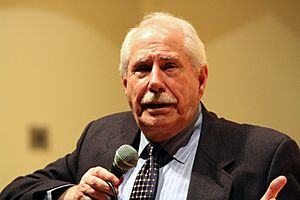
In June 2008, Gravel supported the NYC 9/11 Ballot Initiative. He said it would create a "citizens commission" to investigate the September 11, 2001 terrorist attacks. He believed a true investigation was needed.
In 2013, Gravel attended a conference in Iran. He said it was important to discuss how the U.S. film industry showed Iran. He wanted to prevent "an insane war" between the two nations.
In May 2013, Gravel accepted money from a group that advocates for UFO disclosure. He participated in a "Citizen Hearing on Disclosure." He said, "Something is monitoring the planet." He believed there was an effort to make people with knowledge about UFOs seem silly.
During the 2016 Democratic presidential primaries, Gravel praised Bernie Sanders. He called Sanders "a person of great integrity."
By 2019, Gravel was working on a book called Human Governance. It was about his idea for direct democracy. The book was later published as The Failure of Representative Government and the Solution: A Legislature of the People.
2020 Presidential Campaign
On March 19, 2019, Gravel announced he was thinking about running in the 2020 Democratic primaries. He said his goal was "not to win." Instead, he wanted to bring up issues about "American imperialism" in the debates. A group of teenagers, inspired by a podcast, helped him file the paperwork. Gravel, who was 88 at the time, agreed to their idea. On April 2, 2019, Gravel officially ran for office. His campaign was called the "#Gravelanche."
Gravel's main goal was to get enough small donors to qualify for the debates. He told people not to vote for him. He said he preferred Bernie Sanders and Tulsi Gabbard. Both of them favored a foreign policy that avoided getting involved in other countries' conflicts.
Gravel was not invited to the first Democratic debate in June 2019. He had not met the required number of donations or poll numbers. He tried to qualify for the July debate. However, he was still short on donations. His campaign said it was "nearing its conclusion."
Gravel's campaign reached the 65,000-donor mark on July 12, 2019. This met the qualification for that month's debate. But 20 other candidates had already qualified based on polling, which took priority. So, Gravel was not invited.
The campaign officially ended on August 6, 2019. Gravel endorsed both Bernie Sanders and Tulsi Gabbard for president. His campaign stated they never wanted to win. They saw it as an "intimately democratic" project. Gravel said he would use the remaining campaign funds for charity and a new think tank.
The Gravel Institute
Gravel used some of his leftover campaign funds to start The Gravel Institute in 2019. This is a progressive think tank. It aims to promote "bold and forward-looking ideas about a more peaceful and egalitarian world." It also wants to build a movement of young people. The institute launched in September 2020.
Death
Mike Gravel passed away from multiple myeloma at his home in Seaside, California, on June 26, 2021. He was 91 years old. He was to be buried at Arlington National Cemetery.
The New York Times described Gravel as someone who loved getting attention. He was known for his "long-shot presidential runs." The Washington Post called him an "Alaska Democrat with a flair for the theatrical." The Anchorage Daily News quoted Gravel saying he was "an independent kind of guy." He said his nature made him "stand up, foolishly sometimes, and fight."
Political Views
Mike Gravel was often described as a "maverick" in the Senate. His voting record showed he could be very liberal or more moderate at different times.
Civil Rights
During his 2008 presidential campaign, Gravel said the War on Drugs was a failure. He believed it harmed inner cities. He called for ending capital punishment.
Gravel strongly supported LGBT rights. He supported same-sex marriage. He opposed laws that discriminated against gay and lesbian people. He said "depriving gays and lesbians of equal rights is immoral."
Foreign Policy and Defense
Later in his life, Gravel said he was against American imperialism.
Gravel was firmly against U.S. military action in Iran and Syria. He opposed the Guantanamo Bay detention camp. He also spoke against the use of torture and indefinite detention. He believed the U.S. ignored the Geneva Conventions. In 2014, he called for the full release of a report on CIA torture.
Gravel opposed using international sanctions as a policy tool. He blamed sanctions against Iraq for the deaths of many children. In 2013, he called sanctions against Iran "illegal."
During his 2008 campaign, Gravel called for cutting military spending. He wanted to use the savings to boost public education. He also called for the U.S. to reduce its U.S. nuclear arsenal to encourage other countries to do the same.
In 2008, Gravel criticized House Speaker Nancy Pelosi for not trying to impeach George W. Bush and Dick Cheney. He believed they should be tried for crimes. In 2013, he called President Obama "a total fraud." He said both Bush and Obama should be tried for "crimes and murders."
Economy, Immigration, and Environment
During his 2008 campaign, Gravel supported a FairTax plan. This would get rid of the federal income tax and replace it with a national sales tax. He called the income tax "corrupt." His plan included monthly government payments to families to offset the sales tax on essential goods.
Gravel opposed the North American Free Trade Agreement (NAFTA). He called it unfair and harmful. He believed it was a cause of illegal migration to the U.S. He supported a guest worker program. He also wanted fair ways to bring immigrants into legal status. He saw himself as a "globalist" who believed in open markets and open borders.
As a senator from Alaska, Gravel supported drilling for oil in the Arctic National Wildlife Refuge. However, he opposed it during his 2008 campaign. In 2008, he supported a carbon tax to help fight climate change.
Gravel also supported net neutrality during his presidential campaign.
Education and Health Care
Gravel believed the federal government should pay for college tuition. He called the No Child Left Behind Act "a failure." He wanted it to be "reformed and fully funded." He supported universal pre-kindergarten and expanding the Head Start program. He was open to charter schools and school vouchers. He also suggested longer school days and years. He supported merit pay for teachers.
Gravel called for publicly funded universal health care. He wanted it to replace the current employer-sponsored health insurance system. He supported "full funding" for the VA system. He also supported holistic health care.
Awards and Honors
In 2008, Mike Gravel received the first Isaac Asimov Lifetime Achievement Award from the Columbia University School of General Studies.
Writings
- Gravel, Mike. Jobs and More Jobs. Mt. McKinley Publishers, 1968.
- Gravel, Mike. Citizen Power: A People's Platform. Holt, Rinehart and Winston, 1972.
- revised and reissued as Citizen Power: A Mandate for Change, AuthorHouse, 2008.
- Gravel, Mike and Lauria, Joe. A Political Odyssey: The Rise of American Militarism and One Man's Fight to Stop It. Seven Stories Press, 2008.
- Gravel, Mike and Eisenbach, David. The Kingmakers: How the Media Threatens Our Security and Our Democracy. Phoenix Books, 2008.
- Gravel, Mike. Voice of a Maverick: The Speeches and Writings of Senator Mike Gravel. Brandywine House, 2008.
- Gravel, Mike. Foreword to Poisoned Power: The Case Against Nuclear Power Plants. John W. Goffman & Arthur R. Tamplin, Rodale Press, Inc., Emmaus, PA, June 1971.
- Gravel, Mike. The Failure of Representative Government and the Solution: A Legislature of the People. AuthorHouse, 2020.
Images for kids
 | Janet Taylor Pickett |
 | Synthia Saint James |
 | Howardena Pindell |
 | Faith Ringgold |


